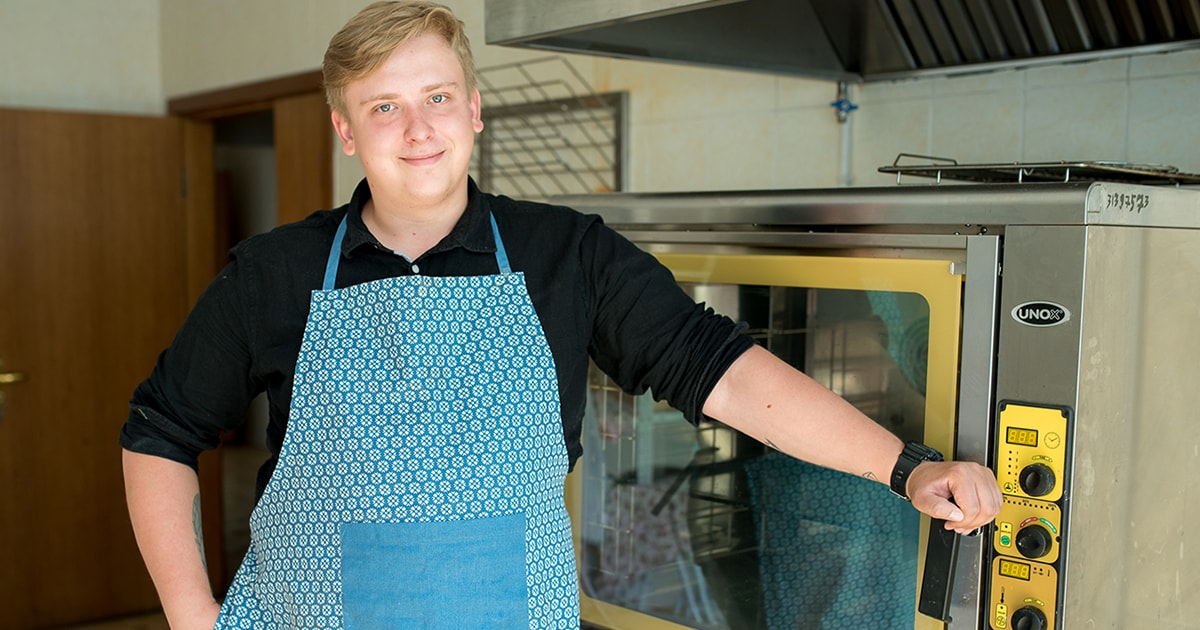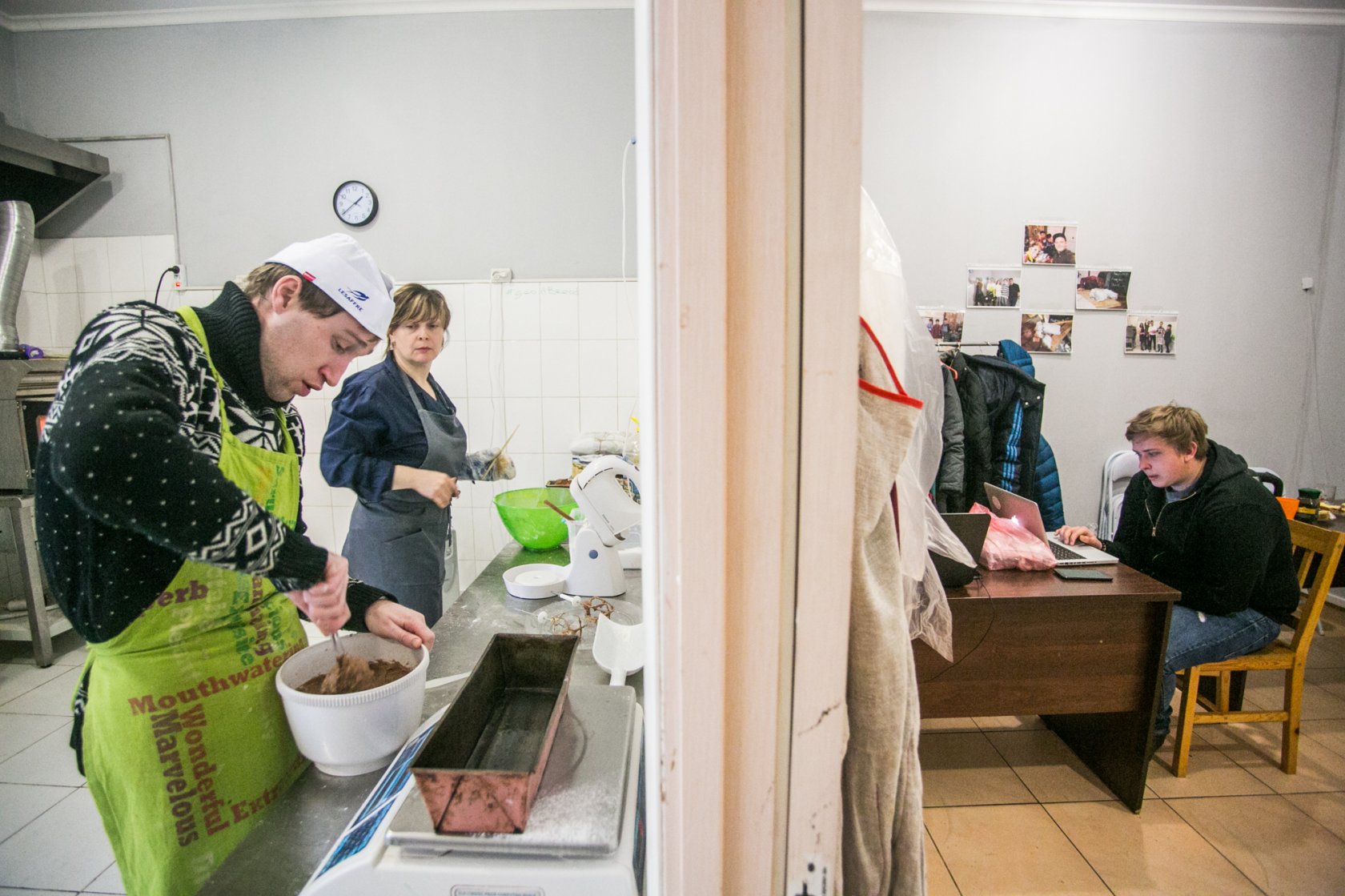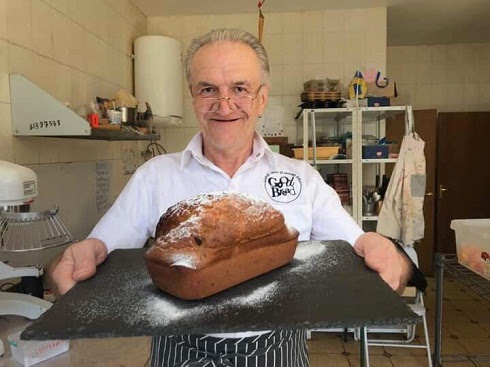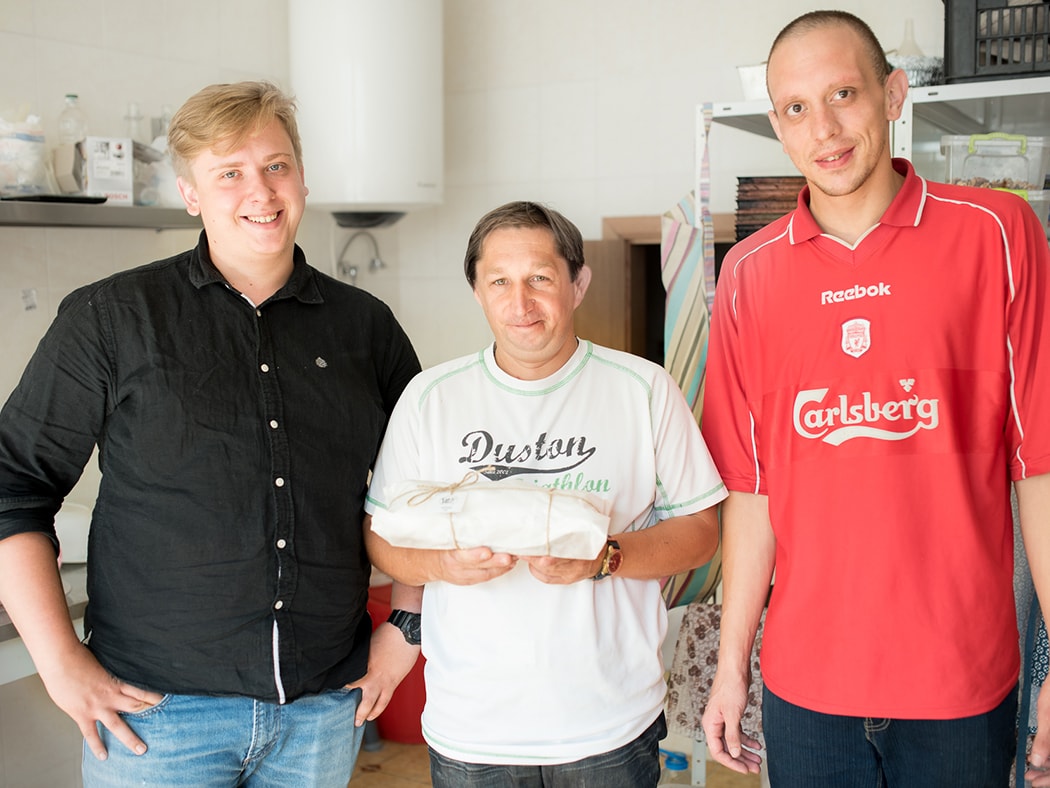How does Good Bread From Good People bakery employ people with mental disabilities?

Photo: Our Kyiv
What is the problem?
You may have seen employees with mental disabilities in supermarkets or coffee shops. That is people who have a developmental disability, autism, or Down syndrome. In Ukraine, it's not easy for such people to find a job, most opportunities for self-realization and development are closed to them. In our society, there is an opinion that such people cannot and are not able to work. According to Vladyslav Malashchenko, founder of the Good Bread From Good People social bakery, few public institutions in Ukraine can work properly with people with mental disabilities.
"There are about 160 psychoneurological boarding schools in our country. 100 to 700 people live in each of them. Gross human rights violations are there at every step. And although I'm a medical teacher by education, I wouldn't like to be involved in such institutions and work there. In my opinion, if you are born or become a person with special needs in the process of life, then our state does everything to punish you for it. The country's system doesn't work for a person with disabilities to live normally: learn, develop, get married, have children," the founder of the social bakery Vladislav Malashchenko is convinced.
What is the solution?
The social bakery "Good bread from good people" has been operating in Kyiv for several years now. It employs people with mental disabilities. Every day they bake cupcakes, cookies, and pies for sale and thus earn money. The bakery allows them to socialize and feel needed.
"We save every life that works for us. A person with a mental or intellectual disability is physically well developed but has intellectual problems. I think this is the most difficult story. When a person is in a wheelchair, they can work mentally, but can't move around. And a person with mental disorders can move, but they don't know where. We do everything so that this person understands what needs to be done. The Good Bread Bakery is not about bread, but about people," Vladislav Malashchenko emphasizes.
How does it work?
During the four years of the bakery's existence, about sixty people with mental disabilities worked in it. Twenty people are currently working and this is the maximum so far, says Vladislav Malashchenko. The other forty workers went their separate ways. According to the entrepreneur, the team very rarely refuses employees. However, there are cases when parents bring 40-year-old unsocialized children to work. It is very difficult for them. The bakery is not engaged in early socialization. This is the task of specialized preschool institutions. Not only does a person have to learn to do something, but it also has to work out over time.
"People with mental disabilities are the most doomed. They have a static life: they are born, go to kindergarten for children with special needs. Then, with the living parents, they are sent to boarding schools and they can live there for a very long time. Then, if they're lucky, they enter colleges. But there are people with mental disabilities who are taught unnecessary professions like shoemaking. I had five employees in this profession and I don't understand why it exists. Often these people go to work centers, they sit there… Later their parents are dying and they are left alone. They don't know how to take care of themselves and the only thing left is to go to a boarding school. And it's very bad there," Vladislav Malashchenko said. According to him, the country pushes people with mental disabilities to such a life, without creating appropriate jobs where they could work and develop.
Solutions that aren't there
When the Good Bread From Good People bakery just opened, people called Vladislav and asked, "Why are you doing this? Do you want to sell us a cupcake that these people spit on?" Then the entrepreneur answered: "You don't spit in food, do you? Why should they have to?" According to Vladyslav, Ukrainian society is stigmatized, but after working on this topic for several years, actively communicating their work, people's attitudes gradually began to change. Over the last five years, many social projects have appeared that help these people. To some extent, this is since everyone has a relative or acquaintance, or an acquaintance of an acquaintance who has an intellectual disability.
"The bakery is a costly affair. I opened it with 150 thousand hryvnias. Now it is unrealistic to do it with this money," says the founder of the social bakery "Good Bread From Good People." "We earn a living from selling our products. And 150 people donate on Patreon. We pay a monthly rent with this money. I have had many meetings with the authorities on the issue of helping people with intellectual disabilities, but everything is at a stop. 90% of any changes are made by NGOs."
Ivanna Vikhtynska, the head of the youth department of the Down Syndrome Association, has been working on the topic of employment of people with disabilities for a long time. She is convinced that there are no ready-made solutions for people with mental disabilities to live their entire adult lives. Few understand their program for the next few years. "We know that schooling is just a continuation of socialization. Only a few work. After all, the employer needs to understand the system of incentives and overcome prejudices for the employment of people with mental disabilities. They shouldn't be left alone with this challenge, because hiring a person with a disability is very responsible. There should be social support for both the worker and the organization. In addition, there should be a system of financial incentives from the state. Today we have a reduced rate of single social contribution: 8.4% compared to the usual 22%. It's not enough. There is no compensation for wages, no financial incentives have been implemented. Therefore, the employer not only accepts serious challenges but also takes a financial blow." According to Ivanna Vikhtynska, it is the local authorities that need to know how many people with mental disabilities live in their community, what obedience they need, and how many jobs to create.
More useful solutions from world experience
In many countries around the world, people with mental disabilities are helped by the state, businesses, and non-governmental organizations, which take over the functions of local government. At the same time, in this story, a business receives pleasant benefits. Of course, there is no single country where all people with mental disabilities would be employed, but there are many positive examples. For example, in Switzerland, if you hire a person with a disability, you are paid for their work and the work of their attendant, i.e. a Methodist social worker. In addition, the state can pay money for what you do. But the employer must understand that, for example, there may be errors in the work of production. However, such people can work well on simple jobs. For example, keep the office clean or make coffee.
"I recently returned from Camphill in Estonia," says Vladislav Malashchenko. And there are six or seven cottages on 100 hectares of land, where people with mental disabilities live. Workers who help them in socialization live with them. It looks like a big commune. They are engaged in crop production and animal husbandry, they earn something from it, they themselves consume what they have grown. I think it's a very cool story. When I first visited camp hill in Latvia, I decided to implement it in Ukraine. I even found land and money. But it turned out to be a very expensive project, 1 million euros for 20 people. In addition, there are many monthly expenses, including utilities and medical services. We realized that my team and I will be able to raise a million euros, but then we will fall into a debt pit. Instead of therapy and socialization of wards, we should look for money for this project every day. But visiting Estonia, I was convinced that implementing Camphill in Ukraine is unrealistic because very few people want to work in it professionally. Lack of professional staff is a problem of campsites around the world. It is not enough to just be a good person. You need to have the knowledge, be very strong, and, most importantly, have a cool head. After all, social therapists treat with the help of themselves."
In the social bakery "Good Bread From Good People" people with mental disabilities bake cakes, quiches, cupcakes, croissants, etc. every day. All 42 items are available on the bakery's website, where they can be purchased. In addition, anyone who wants to help not only the bakery but also those who need it can order a "suspended" cupcake. It will go to lonely retirees, people who are in mental hospitals or other medical institutions, and thus give them a piece of warmth and kindness.
The article was prepared based on the program "Activation with Liudmila Tyahnyriadno," which is broadcast on Ukrainian Radio and Radio Culture.
Listen to the broadcast: https://cutt.ly/qTfvut5
Watch the broadcast: https://cutt.ly/7Tfvg0x























































